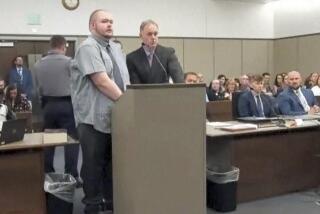Judge in Colorado theater shooting clears way for arraignment
- Share via
CENTENNIAL, Colo. — The judge in the Aurora movie theater massacre case has rejected a defense argument that Colorado laws on insanity pleas are unconstitutional, paving the way for a long-awaited arraignment next week.
James E. Holmes, 25, was arrested without resistance minutes after a gunman opened fire July 20 in a packed theater during the showing of “The Dark Knight Rises.” Twelve people were killed and about 70 others were wounded in a crime that horrified the nation and has now become fodder in the debate over gun control. Holmes faces 166 counts and has been held in isolation without bail ever since. He has not yet entered a plea.
But now that could change.
Chief Judge William B. Sylvester of Colorado’s 18th Judicial District ruled that the state’s insanity plea laws do not violate Holmes’ constitutional right against self-incrimination, his right to remain silent, or his right to due process, and that the case should proceed to arraignment. It is scheduled for Tuesday.
Still, some legal analysts said Friday that the issue is far from settled because Sylvester chose not to address any potential constitutional issues involving the death penalty. “The court respectfully declines the invitation to answer any questions that depend on facts and circumstances not presently before the court,” Sylvester wrote.
The prosecution has about 60 days after arraignment to decide whether to seek the death penalty, and is widely expected to do so. The defense hasn’t said whether Holmes will enter an insanity plea. Each decision could greatly affect how the other side proceeds.
“It is a bit like a game of chicken,” said Rick Kornfeld, a former federal prosecutor who is now a Colorado defense attorney.
Karen Steinhauser, an adjunct law professor at the University of Denver Sturm College of Law, predicted that if this did become a death penalty case, all of the defense’s constitutional concerns would soon come roaring back.
These are uncharted waters in Colorado because this is thought to be the first potential death penalty case in which an insanity plea is expected since state laws changed in the 1990s. Previously, a separate trial was held to determine sanity. Now the question is handled in the same trial.
Capital cases in Colorado are extremely rare. Only three people are on the state’s death row. A person found to be insane cannot be put to death.
Yet insanity pleas are also rare and greatly misunderstood by the public, Kornfeld said.
During Holmes’ preliminary hearing in January, the prosecution introduced grisly evidence showing a well-planned march toward the massacre, including months of gun, ammunition and military-style gear purchases and the booby-trapping of Holmes’ apartment.
Still, meticulous planning does not rule out insanity. The question is whether someone is insane and knows right from wrong at the moment of the crime. “One can be methodically insane,” Kornfeld said.
Last week, the defense filed a blitz of motions challenging the state’s insanity plea laws and process — especially in the context of the death penalty — arguing that they were vague and put Holmes in a Catch-22 position:
If an insanity plea was entered, Holmes would be immediately examined by state psychiatric experts. If he cooperated, all of his past mental health records would be available and he would lose prior doctor-patient privilege, including that between him and the University of Colorado-Denver psychiatrist he saw once about six weeks before the shooting. Dr. Lynne Fenton has testified she became alarmed enough about Holmes to call campus police. Holmes also sent her a notebook that reportedly outlined his plans.
But if Holmes refused to cooperate, his lawyers argued, it could be used against him and Colorado law would not allow them to introduce defense testimony of his mental condition. In a death penalty case, juries must consider mitigating factors such as mental illness.
The prosecution countered that Colorado’s laws on the insanity defense had already been upheld. Sylvester ultimately sided with the prosecution.
Court officials are expecting an overflow crowd on Tuesday and are setting up a separate room for relatives of victims. Sylvester has agreed to allow cameras, but no audio, in the courtroom.
More to Read
Sign up for Essential California
The most important California stories and recommendations in your inbox every morning.
You may occasionally receive promotional content from the Los Angeles Times.













